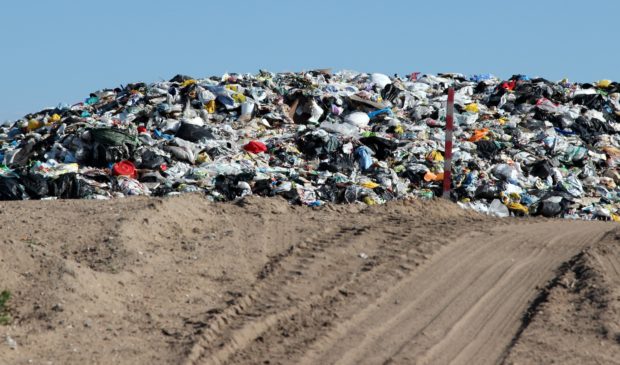Garbage companies fight over landfill standards
Monday, May 7, 2018 by
Jack Craver Over the past two years, City Council has faced challenges in deciding who to pay to haul and dispose of the large amount of trash generated by city facilities.
One of the big local trash players, Texas Disposal Systems, has claimed that city lobbying rules, which limit communications between a company bidding on a contract and city officials, put it at a disadvantage because its employees are constantly in communication with city officials relating to an existing, long-term deal it has with Austin Resource Recovery to dispose of curbside waste at the TDS landfill in Creedmoor, southeast of the city.
Council responded to the company’s concerns, first by revising lobbying rules and then by directing city staff to develop a new point system for evaluating landfills.
Others in the waste industry have complained that Council has bent over backward to address the complaints of one company with key political connections, including a lobbyist, David Butts, who has worked as a campaign consultant for six members of Council.
Two haulers who spoke with the Austin Monitor worry that the current draft of the landfill rating system matrix appears aimed at ensuring that city waste goes only to the TDS landfill as opposed to the other major city dump, the Austin Community Landfill, which is located in northeast Austin and operated by Waste Management, the nation’s largest waste company.
Notably, the matrix awards points to landfills that have not been used as dumps for industrial waste. It also awards points to landfills that do not have a history of being opposed by previous Council policy.
Both of those provisions are ostensibly aimed at the Austin Community Landfill, which is home to industrial waste that was dumped there nearly 50 years ago, before the creation of the Environmental Protection Agency and stricter rules regarding the disposal of hazardous waste. In 2007, Council approved a resolution opposing a proposed expansion of the ACL and called on the city to work towards closing it and a neighboring dump, the Sunset Farms Landfill operated by Republic Services, by 2015. Sunset Farms did close in 2015 and the ACL was never expanded.
Kerry Getter of Balcones Recycling said that dumping costs have risen dramatically over the past few years, notably as a result of the recent closure of a landfill managed by Republic Services. A large percentage of the material his company receives cannot be recycled and must be sent to landfills. If the city refuses to deal with one of the city’s two dumps, that will only drive prices higher, he said.
“The costs for folks to bury garbage will continue to escalate,” he said. “We need to have competition.”
Andrew Dobbs, a lobbyist for Texas Campaign for the Environment, which has provided input on the matrix, has no problem with a system that works against the WM landfill.
“The whole point here was for the city to not send materials to that problem facility,” he said, suggesting that the matrix was simply a roundabout way of accomplishing that.
Dobbs said that the city risks being held liable in future litigation over the industrial waste at the site and any subsequent cleanup. Federal law allows entities that dump waste on top of hazardous materials to be held responsible.
“Every ton of waste that the city puts into that facility would increase its liability,” he said, arguing that WM’s “high-powered attorneys” will do everything they can to convince courts and regulators that the city should be held liable instead of the company.
Concerns about the rising cost of dumping trash should prompt the city to focus more on diverting material from landfills through recycling and composting, not to create more landfills, said Dobbs.
Adam Gregory of TDS similarly said that the Austin Community Landfill should be excluded from city contracts.
In a statement, WM said that the landfill matrix was unnecessary and that the city would be better off basing its decisions on the “stringent requirements” imposed by the state.
Steve Shannon, a municipal marketing manager for Waste Connections, a national hauler that uses the WM landfill, said that opposition to the site is misguided.
“That landfill and that hazardous material that was buried out there 40 years ago has been isolated and capped in accordance with state and federal regulations,” he said. “It’s not going anywhere.”
Shannon dismissed the idea that the city could find itself responsible for a multimillion-dollar cleanup of the site, arguing that it’s not in the interest of WM.
“The notion that a reputable solid waste company would somehow put a municipality like the city of Austin in jeopardy and just walk away is so remote,” he said. “That would be business suicide.”
Shannon added that the “community should be grateful” that a company with WM’s experience and financial resources is in charge of such a sensitive site.
Kaiba White, an environmental advocate for Public Citizen as well as a member of the Zero Waste Advisory Commission, said that the concerns about the Austin Community Landfill should be taken seriously but that WM “has been making a good-faith effort to do right by the community.”
In addition, said White, “If you create a matrix that has too much weight focused on the past, you do risk not having that carrot to hold out (to encourage better practices).”
Although few are willing to speak on the record, city staffers, environmentalists and others in the garbage industry grumble that Texas Campaign for the Environment tends to go to bat for TDS’s interests, possibly as a result of contributions it receives from the company.
Dobbs ridiculed the idea that the organization was influenced by donations. Without disclosing the amount of money given by TDS, he said that over 90 percent of the group’s funds come from individual “grass-roots sources” and that there is no single donor that the group could not afford to lose. His group often supports TDS, he said, because the company engages in better environmental practices, which he would like to see more companies adopt.
The Zero Waste Advisory Commission will review and vote on the draft matrix in June. After that, Council will vote on it.
This story has been changed to reflect the fact that City Council has never explicitly said that the ACL site should not be used. Photo by Estormiz [CC0], from Wikimedia Commons.
The Austin Monitor’s work is made possible by donations from the community. Though our reporting covers donors from time to time, we are careful to keep business and editorial efforts separate while maintaining transparency. A complete list of donors is available here, and our code of ethics is explained here.
You're a community leader
And we’re honored you look to us for serious, in-depth news. You know a strong community needs local and dedicated watchdog reporting. We’re here for you and that won’t change. Now will you take the powerful next step and support our nonprofit news organization?









